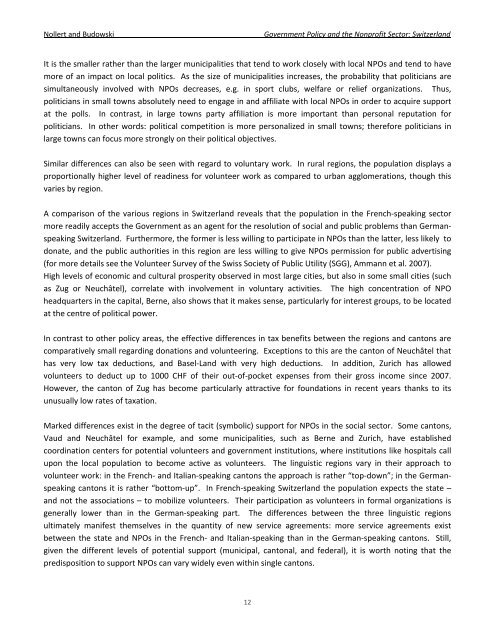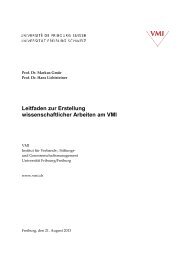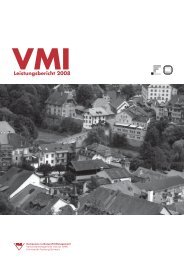Government Policy and the Nonprofit Sector: Switzerland - VMI
Government Policy and the Nonprofit Sector: Switzerland - VMI
Government Policy and the Nonprofit Sector: Switzerland - VMI
- TAGS
- nonprofit
- switzerland
- vmi.ch
Create successful ePaper yourself
Turn your PDF publications into a flip-book with our unique Google optimized e-Paper software.
Nollert <strong>and</strong> Budowski <strong>Government</strong> <strong>Policy</strong> <strong>and</strong> <strong>the</strong> <strong>Nonprofit</strong> <strong>Sector</strong>: Switzerl<strong>and</strong><br />
It is <strong>the</strong> smaller ra<strong>the</strong>r than <strong>the</strong> larger municipalities that tend to work closely with local NPOs <strong>and</strong> tend to have<br />
more of an impact on local politics. As <strong>the</strong> size of municipalities increases, <strong>the</strong> probability that politicians are<br />
simultaneously involved with NPOs decreases, e.g. in sport clubs, welfare or relief organizations. Thus,<br />
politicians in small towns absolutely need to engage in <strong>and</strong> affiliate with local NPOs in order to acquire support<br />
at <strong>the</strong> polls. In contrast, in large towns party affiliation is more important than personal reputation for<br />
politicians. In o<strong>the</strong>r words: political competition is more personalized in small towns; <strong>the</strong>refore politicians in<br />
large towns can focus more strongly on <strong>the</strong>ir political objectives.<br />
Similar differences can also be seen with regard to voluntary work. In rural regions, <strong>the</strong> population displays a<br />
proportionally higher level of readiness for volunteer work as compared to urban agglomerations, though this<br />
varies by region.<br />
A comparison of <strong>the</strong> various regions in Switzerl<strong>and</strong> reveals that <strong>the</strong> population in <strong>the</strong> French‐speaking sector<br />
more readily accepts <strong>the</strong> <strong>Government</strong> as an agent for <strong>the</strong> resolution of social <strong>and</strong> public problems than German‐<br />
speaking Switzerl<strong>and</strong>. Fur<strong>the</strong>rmore, <strong>the</strong> former is less willing to participate in NPOs than <strong>the</strong> latter, less likely to<br />
donate, <strong>and</strong> <strong>the</strong> public authorities in this region are less willing to give NPOs permission for public advertising<br />
(for more details see <strong>the</strong> Volunteer Survey of <strong>the</strong> Swiss Society of Public Utility (SGG), Ammann et al. 2007).<br />
High levels of economic <strong>and</strong> cultural prosperity observed in most large cities, but also in some small cities (such<br />
as Zug or Neuchâtel), correlate with involvement in voluntary activities. The high concentration of NPO<br />
headquarters in <strong>the</strong> capital, Berne, also shows that it makes sense, particularly for interest groups, to be located<br />
at <strong>the</strong> centre of political power.<br />
In contrast to o<strong>the</strong>r policy areas, <strong>the</strong> effective differences in tax benefits between <strong>the</strong> regions <strong>and</strong> cantons are<br />
comparatively small regarding donations <strong>and</strong> volunteering. Exceptions to this are <strong>the</strong> canton of Neuchâtel that<br />
has very low tax deductions, <strong>and</strong> Basel‐L<strong>and</strong> with very high deductions. In addition, Zurich has allowed<br />
volunteers to deduct up to 1000 CHF of <strong>the</strong>ir out‐of‐pocket expenses from <strong>the</strong>ir gross income since 2007.<br />
However, <strong>the</strong> canton of Zug has become particularly attractive for foundations in recent years thanks to its<br />
unusually low rates of taxation.<br />
Marked differences exist in <strong>the</strong> degree of tacit (symbolic) support for NPOs in <strong>the</strong> social sector. Some cantons,<br />
Vaud <strong>and</strong> Neuchâtel for example, <strong>and</strong> some municipalities, such as Berne <strong>and</strong> Zurich, have established<br />
coordination centers for potential volunteers <strong>and</strong> government institutions, where institutions like hospitals call<br />
upon <strong>the</strong> local population to become active as volunteers. The linguistic regions vary in <strong>the</strong>ir approach to<br />
volunteer work: in <strong>the</strong> French‐ <strong>and</strong> Italian‐speaking cantons <strong>the</strong> approach is ra<strong>the</strong>r “top‐down”; in <strong>the</strong> German‐<br />
speaking cantons it is ra<strong>the</strong>r “bottom‐up”. In French‐speaking Switzerl<strong>and</strong> <strong>the</strong> population expects <strong>the</strong> state –<br />
<strong>and</strong> not <strong>the</strong> associations – to mobilize volunteers. Their participation as volunteers in formal organizations is<br />
generally lower than in <strong>the</strong> German‐speaking part. The differences between <strong>the</strong> three linguistic regions<br />
ultimately manifest <strong>the</strong>mselves in <strong>the</strong> quantity of new service agreements: more service agreements exist<br />
between <strong>the</strong> state <strong>and</strong> NPOs in <strong>the</strong> French‐ <strong>and</strong> Italian‐speaking than in <strong>the</strong> German‐speaking cantons. Still,<br />
given <strong>the</strong> different levels of potential support (municipal, cantonal, <strong>and</strong> federal), it is worth noting that <strong>the</strong><br />
predisposition to support NPOs can vary widely even within single cantons.<br />
12











